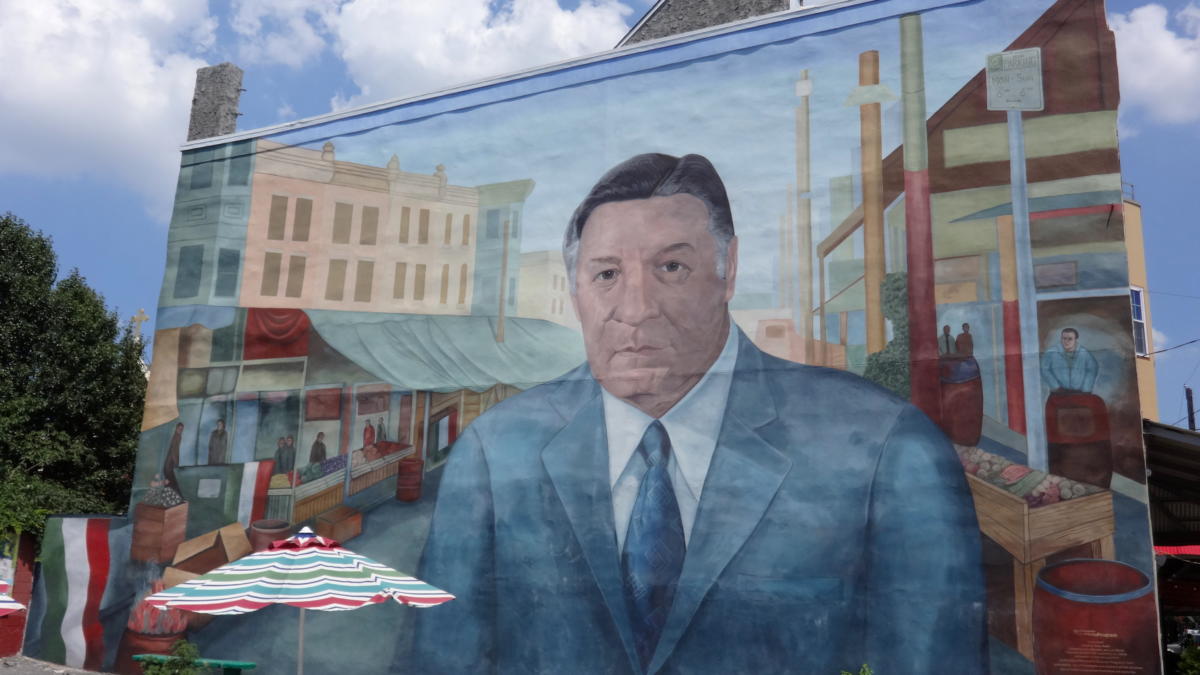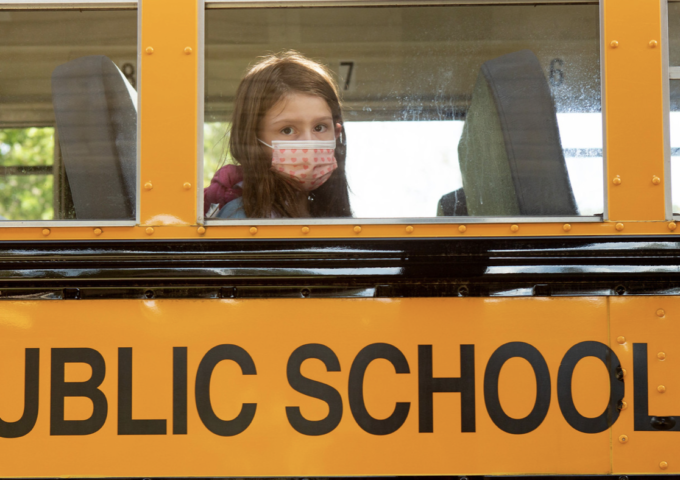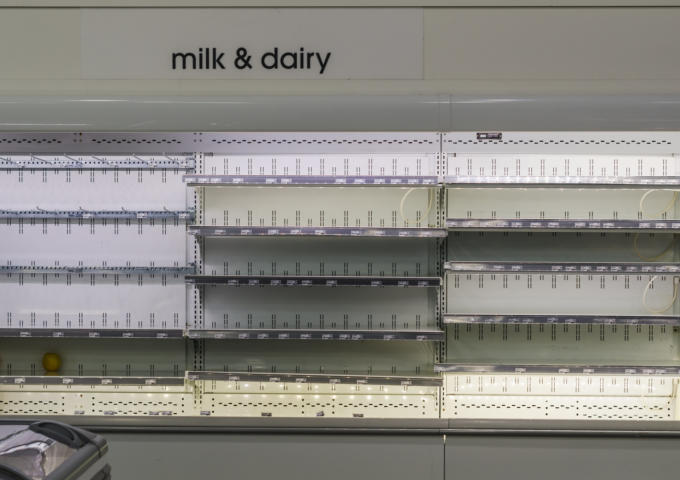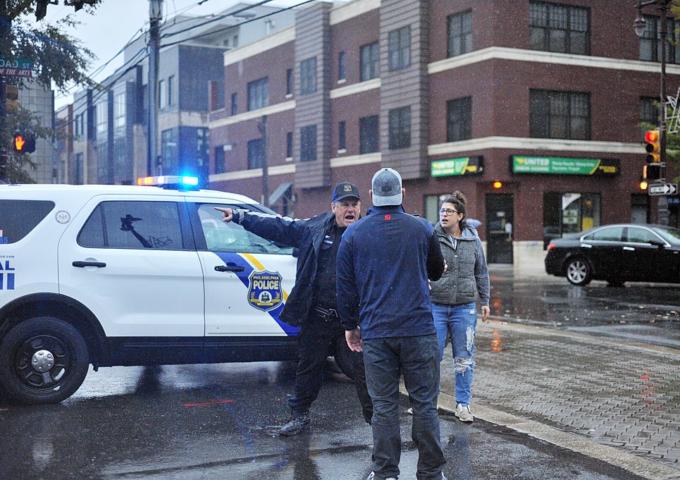Growing up in Rizzo’s Philly
This is my story – the story of my childhood. It is also coincidentally a story about Frank Rizzo.
I was born in 1971, and my parents and I lived over the old Rexall Drug Store on Rising Sun Avenue in Lawndale. I was 7 weeks old when Francis Lazzaro Rizzo was elected mayor. My father was the leader of the 35th Ward, and together my parents worked to bring positive change. At a ward meeting, Rizzo said he knew how to deal with it (the “black problem”) once and for all. He raised his foot in the air. “I just kick them all in the balls so they can’t make any more ni**ers!” he shouted. My parents knew they had to do what they could to help stop this man.
Citizens could vote as they wished, but a ward leader’s endorsement and promotion of a candidate held weight. It was the 1971 primary season, and the time had come for the ward leaders to declare their allegiance. The chairman introduced Rizzo as the candidate and went around the room as each gave their pro forma reply. When they reached the 35th Ward, my mother rose. “No” was all she said. Simply, clearly, unequivocally, no. Rizzo flew into a rage and leapt to his feet screaming “Who is this?? Who the #$@ does she think she is?” shaking his fists in the air. A few weeks later, one of his right-hand men pulled up alongside my father in a black sedan and offered him $15,000 cash to hand over the 35th Ward. He declined.
But it was the primary of his reelection campaign in 1975 when things got really lively. The climate was dramatically different by then. Rizzo’s endorsement of Nixon and failure of a polygraph had turned many against him. The New Democratic Coalition had been formed to clean up the corruption in the voting process, and my mother served as its chair – there were eyes on the elections now. Once again, the sacred ritual of the ward leaders was held. This time my father stood up and said “no.”
From that moment on we were marked. Francis and his band of thugs sought to “persuade” my parents to change their mind. Phone calls came every night in the wee hours – insults, obscenities, threats. Hand over the votes, or the kid gets it, they were told. They knew I went to school at Ravenhill – my mother sat outside my nursery classroom each day, terrified. Small bands of his supporters paced in front of our building, shouting insults and dirty names. When we ventured out, cops followed us, either on foot or driving slowly beside.
I remember returning from an excursion to Furlough’s 5 and 10, our uniformed blue shadow on the corner near us, casually leaning up against a lamppost, smirking. My mother’s hands shook so badly she couldn’t get the key in the lock. She began to cry. Just as he took steps toward us, the metal found its mark, and she pulled me in the door as she collapsed to the floor. Committee members began walking us home, fearing for our safety. One day, another sedan sidled up to my father. This time no cash was proffered. Instead, they shoved a gun in his face and gave him a Hollywood-style “or else” ultimatum. My parents never gave in. But Rizzo retained the Democratic nomination, so I was given a reprieve. In the fall, my parents did not vote Democratic for the first time in their lives, but for Charles Bowser, the black independent candidate. When Rizzo’s brutish rule was finally done, we campaigned enthusiastically for my godfather, Bill Green, and wept with joy and relief when Francis was forced to hand over the reins to him in 1980.
In the late-90s, Terry Gross was interviewing one of Rizzo’s biographers, as I drove down 309. The repeated references to his saintly status incensed me. I ranted at the radio, yanked my Mazda into the parking lot of the Yum Yum Donuts, and dialed the station number from the Superman-style phone booth. Within a minute, I was on the air. It was the first time I’d spoken of it in eons, but it was still too raw. I stumbled over my words. I shook so hard I kept dropping the receiver from my slick, sweaty hands. That was the first time I realized how much trauma from that man still lay unprocessed in my bones. I grew up knowing that the policeman on the corner was not there to protect me but to possibly kill me – that those in power care nothing for the lives of their citizens. The monsters of my childhood did not live under the bed and vanish when I peeked. They were intensely real. He instilled fear in the whole city – fear that some of us have spent a lifetime trying to rid ourselves of.
I have watched events in this nation unfold with shock and grief. But I found great hope at what it has sparked in my hometown. The mural that loomed over the Italian Market like Big Brother has been painted over. The statue that made so many of us sick, is finally gone.
George Floyd’s death seems to have catalyzed the revolution of conscience that my parents and so many others tried hard to nurture almost 50 years ago – I pray this time it will take firmer root, flourish, and thrive. I cheered for the protestors trying to pull down the statue – saying no to him, once again – saying no to the bully now in the White House who bears so many striking resemblances to the monster of my childhood.
So often in the face of injustice we don’t know what to do, and we clearly all need to do much more. I know I do, anyway. But I look to my mother as a good place to start. Just that one word has so much power. No. No more. No to all of it and those who allow it. We will not permit you to twist and pervert our city, our country, our world. Just no.
Tara C. Trapani | Vermont

The SHOUT Out
Following the protests after George Floyd’s death, there have been calls to “defund the police.”
Your turn: What does “defund the police” mean to you? Abolish the department? Redirect some funds? Send your responses to voices@philadelphiaweekly.com

Stop racial discrimination at the library
After meeting with several Black employees of the Library to share our experiences and concerns, we have determined that racial discrimination and disregard for Black safety, success, prosperity, and life at the Free Library will no longer be tolerated.
● At the library, Black staff routinely experience racial discrimination, harassment, microaggresions, and other forms of workplace bias.
● Black staff at the library are largely relegated to non-professional positions, including custodians, municipal guards, and library assistants, and therefore earn $7,533 less than the median salary, while white staff earn $12,012 more than the median salary.
● Black Americans “experience the highest overall mortality rates and the most widespread occurrence of disproportionate deaths” due to COVID-19. Our mortality rate is “2.3 times as high as the rate for whites and Asians, and 2.2 times as high as the Latino rate.”
● Armed white vigilante groups patrol areas of Philadelphia where Black staff is asked to return to work.
Black staff at the Free Library of Philadelphia have serious concerns about our health and safety. Our pre-COVID work was on the frontlines, serving Philadelphians in a manner that requires face-to-face activity that makes us most vulnerable to infection. Now is the time for the Free Library to be anti-racist.
We cannot return to business as usual and must find different and better ways to serve the public while keeping our staff and patrons safe. We are calling for accountability and action regarding the Free Library’s plan to protect Black workers as PA moves through the Yellow and Green phases.
We demand the following immediately before any Black staff is required to report to any Free Library locations.
1. A commitment to protecting Black lives on staff.
2. A formal and transparent investigation of Black staff’s concerns regarding physically reporting to Free Library locations. Current decisions were made using a misleading survey.
3. A plan, developed with Black staff, to provide library services that take into account Black people’s increased COVID-19 infection and mortality rates.
4. Support and accommodations for Black staff whose Library work makes them susceptible to racial violence.
5. Provide Black staff the same opportunities to work from home that white staff have.
6. We demand that staff with librarian degrees who work in management, executive, and specialty positions are redeployed to cover the shortages in staff due to COVID-19 and the lay off of seasonal employees. Most of whom are Black.
In a public statement, the Free Library wrote that it must “confront structural racism, both inside our organization as well as in all of our public-facing and public-service efforts,” and that “the work to root out institutional racism must occur before we can realize the organizational changes and the necessary healing that the Free Library needs.” Now is the time for Library leadership to listen to Black staff, root out institutional racism, and make good on your public statement that #BlackLivesMatter.
– Concerned Black Workers of The Free Library of Philadelphia



